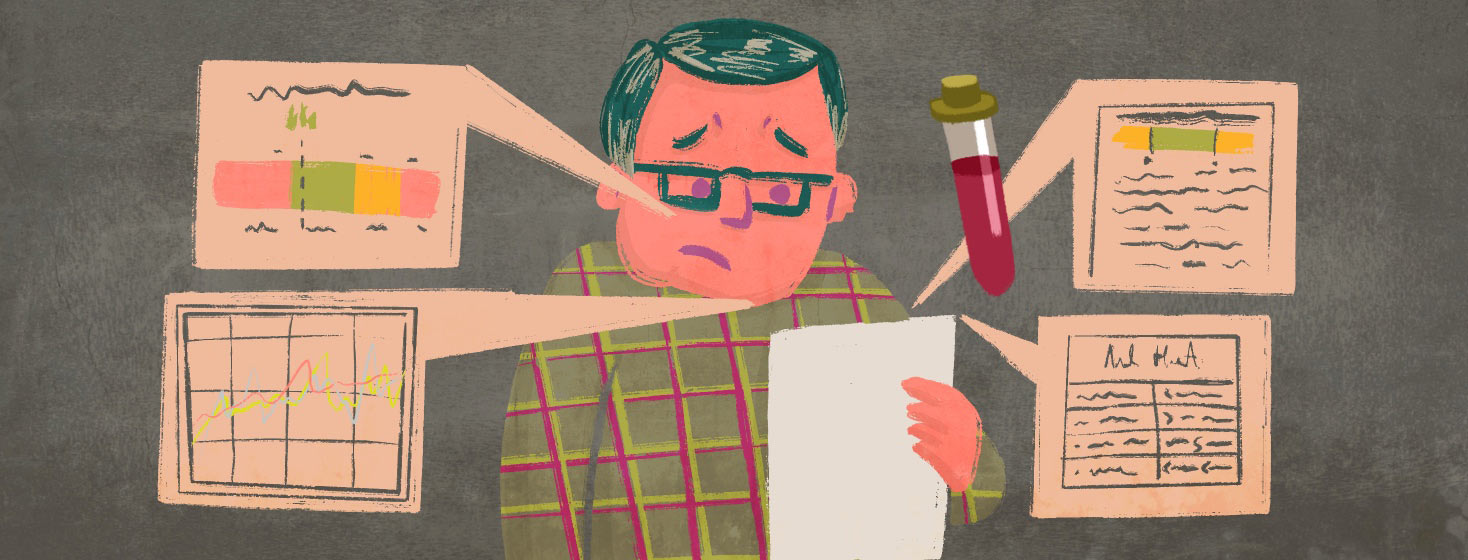Making Sense of Cholesterol Tests Results
A cholesterol test (also known as a lipid panel) measures the amount of "good" and "bad" cholesterol and triglycerides (fats) in your blood. Results from this test can help your doctor figure out how effectively your body handles fats.1
Fat abnormalities in the blood can occur with HIV. This can happen because of the disease itself or the drugs that treat the condition. Either way, your doctor will want to know what your cholesterol levels are, and you should know them as well.2
Making sense of your cholesterol test results means understanding:
- What cholesterol is
- Why cholesterol is essential to good health
- The purpose of a cholesterol test
What is cholesterol?
Cholesterol is a natural substance made in the liver and found in all body parts. It is a kind of wax, and it helps keep the body working correctly. Your body needs cholesterol to:3
- Build cells
- Make vitamins and hormones
- Stay healthy
However, too much cholesterol can be harmful and can cause health problems.
What does a cholesterol test measure?
Each component of the cholesterol test is measured in milligrams per decilitre (mg/dL). There are 4 parts to a cholesterol test:4,5
Total cholesterol: A measurement of 3 types of fat in your blood:
- Low-density lipoproteins (LDLs or “bad” cholesterol)
- High-density lipoproteins (HDLs or “good” cholesterol)
- Triglycerides
LDL: Too much LDL increases your risk of:
- Heart and blood vessel (cardiovascular) disease
- Stroke
- Hardened and blocked arteries (atherosclerosis)
HDL: HDL removes cholesterol from the walls of your blood vessels and from your blood.
Triglycerides: The primary type of fat found in your body are triglycerides. Triglycerides are 3 fatty acids joined together by a molecule called glycerol. Having high levels of triglycerides in your blood is a risk factor for heart disease, stroke, and conditions such as type 2 diabetes. However, not everyone with high triglyceride levels develops these conditions.
HIV and cholesterol
Before effective HIV treatments, many people with HIV had cholesterol abnormalities. People with untreated HIV often have high LDL cholesterol and low HDL cholesterol levels. Doctors have now found that people living with HIV may have lower levels of HDL cholesterol and greater amounts of triglycerides, even when they are following a treatment regimen.2
What do my test results mean?
Your ideal values will vary slightly depending on your age and sex. In general, ideal values include:1,5
- Total cholesterol: Less than 200 mg/dL
- LDL: Less than 100 mg/dL
- HDL: 40 to 50 mg/dL (the higher, the better)
- Triglycerides: Less than 150 mg/dL
Why does this matter?
As the amount of harmful fat increases in your blood and blood vessels, your risk for heart disease and stroke increases.3
When cholesterol joins with other substances in the blood, plaques form inside arteries, making them stiff and less flexible. This can lead to artery narrowing, which reduces blood flow to the heart muscle resulting in angina (chest pain) or a heart attack. That is why it is vital to have your cholesterol tested so you know your levels.3
Sources of cholesterol
There are 2 sources of cholesterol – cholesterol that your body makes and cholesterol that you eat. The cholesterol that your body makes comes from your liver. The other cholesterol in your body comes from animal foods, like: 1
- Meat
- Poultry
- Dairy products
Some foods high in cholesterol are also high in saturated and trans fats. These fats cause your liver to make more cholesterol than it would otherwise. The added cholesterol from the liver makes some people’s total cholesterol too high.1
Tropical oils include saturated fat and increase blood cholesterol levels. These oils are often used in baked goods. Examples include:3
- Palm oil
- Palm kernel oil
- Coconut oil
Cholesterol-lowering tips
The 2 main ways to lower your blood cholesterol are:1,3
- Lifestyle changes
- Drug treatment
Living a heart-healthy lifestyle means making changes which include:1,3,6
- Limiting saturated and trans fats in your diet
- Eating foods that lower cholesterol, like:
- Oats
- Barley
- Whole grains
- Maintaining a healthy body weight
- Getting regular exercise daily, at least 30 minutes most days if you can
- Reducing your stress level
- Quitting smoking if you smoke
If lifestyle changes are not enough, your doctor might suggest drug treatment to lower your cholesterol levels. Different drugs, including statins, can lower cholesterol levels. Each has risks and benefits and may or may not be appropriate for you.
Talk to your doctor about your treatment choices, changes to your diet or lifestyle you can be making, and general cholesterol-lowering tips. Your doctor may need to add to or change your treatment regimen.1-6

Join the conversation